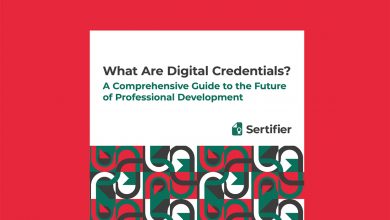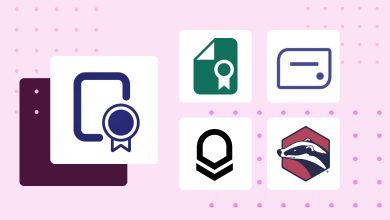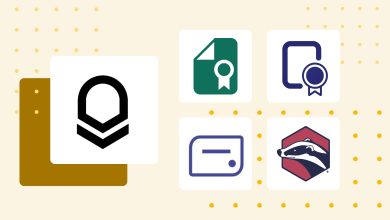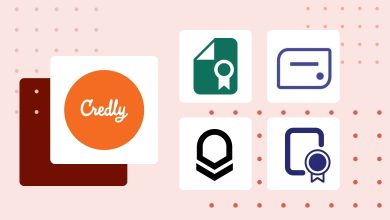Digital Credential Management for Your Mini-Courses
Contents
What Is a Mini-course?
Mini-courses are short, focused learning units that teach a specific skill or concept. They can be used in a variety of contexts, including education, training, and professional development. Mini-courses have multiple use cases, including onboarding new employees, providing continuing education, supplementing traditional learning, updating skills, and testing knowledge. These are flexible and effective ways to deliver targeted and focused learning experiences that help employees improve their skills and stay current in their field.
Mini-courses are perfect for those who prefer short, focused study sessions to help them acquire new knowledge and skills quickly. They can also be used to complement traditional learning methods such as face-to-face or online courses, or as a standalone study option. They are useful learning tools for a wide range of people, regardless of profession or professional status.
In addition to educational purposes, they are effective for lead magnets and marketing efforts. It’s a great way to introduce your products and services to potential customers and demonstrate your expertise in a particular area. By offering a mini-course as a lead magnet, you can attract people interested in learning more about a particular topic and encourage them to sign up for your mailing list or follow your social media accounts. This helps build an audience of potential customers interested in your product or service.
Mini-courses can also be used as part of a marketing campaign to promote a specific product or service. For example, you can create a mini-course that teaches how to use your product or service, or show you how to solve a problem that your product or service can help with. This is a great way to attract potential customers and demonstrate the value of your product or service.

The ideal length of a mini-course depends on the topic and learning objectives. They are focused, concise, and usually shorter than traditional courses. Some of them last only a few minutes, while others last several hours. When determining the length of a mini-course, it is important to consider the complexity of the subject matter and the amount of information covered. It should be as short and focused as possible, but should cover all the information necessary to keep the learner interested and ensure that they retain the knowledge they have learned.
Many professionals can benefit from creating mini-courses and sharing them within their community and audience. While freelancers can use them to build their client base, entrepreneurs can use it to demonstrate their expertise in a particular area.
In summary, mini-courses are an effective way of delivering a targeted and focused learning experience that not only helps individuals improve their skills and stay current in their field, but also it’s also a powerful lead generation and marketing tool.
Introduction to Mini-Course Generator
Mini-Course Generator allows educators to follow a step-by-step process to create mini-courses easily. Customizable content templates for specific use cases make it easy to create cohesive and visually appealing courses. Besides, AI Course Creator is a handy way to save time and energy. It also includes tools to add multimedia elements, such as videos and images to make your courses more engaging.
Mini-Course Generator also includes features that allow educators to easily set up and sell courses. Creators can easily share their mini-courses and mini-course collections on their socials or embed interactive content on their website to get paid with direct Stripe integration. It can be used together with LMS tools and inside membership sites as well.
Mini-Course Generator’s features and functionalities can be useful for anyone who wants to create and deliver a structured educational experience. For example, it could be helpful for corporate trainers, workshop facilitators, or educators who want to create engaging and interactive online learning experiences for their students. The platform’s ability to create and deliver bite-sized courses can be particularly useful for those who want to provide quick and easy access to information and training on specific topics.
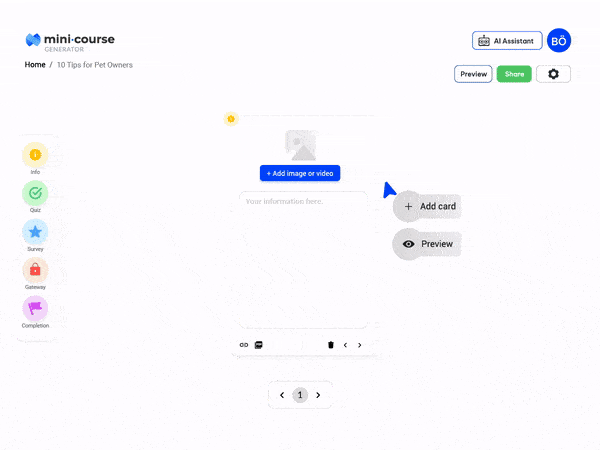
The Basics of Digital Credential Management
Digital credential management is the process that involves creating, issuing, managing, and validating digital credentials. A digital credential is an electronic record of an individual’s achievements, skills, and abilities that can be used to demonstrate skills and experience to employers, educational institutions, and other parties. Digital credentials may include certificates, badges, diplomas, and other types of records that represent personal achievements.
Digital credential management uses specialized software tools and platforms to create and issue digital credentials. These tools enable exhibitors to design and customize credentials, set criteria for obtaining credentials, and automate the issuance process. Issued digital credentials can be stored and managed in a digital wallet or platform so they can be easily shared and verified. Digital credential management platforms typically offer features such as analytics and reporting, providing valuable insight into credential usage and its impact on the career development of credential holders.
Sertifier is one such digital credential management platform, offering a variety of features that enable issuers to create and issue digital credentials. The platform allows users to design and customize their credentials using templates or upload their own designs. Users can also set criteria for retrieving credentials. Recipients can store their digital credentials in their digital wallets or share them on social media platforms like LinkedIn. Sertifier also provides features such as analytics and reports to help exhibitors track the usage and impact of their digital credentials.
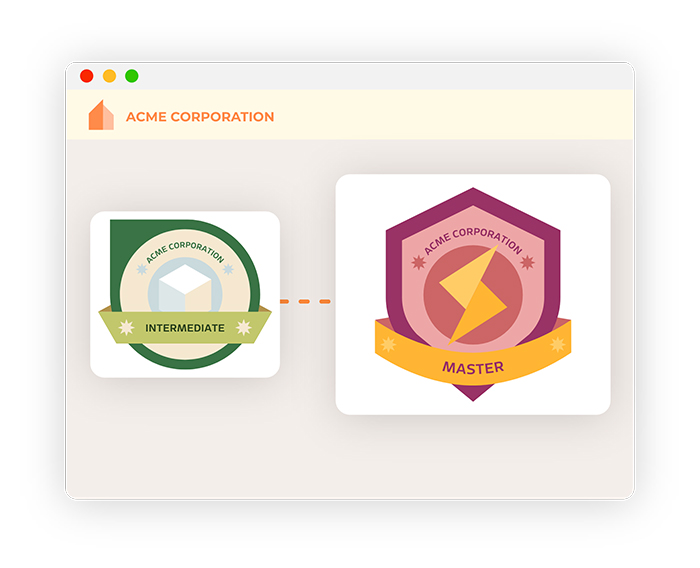
Advantages of Incorporating Credential Management into Mini-Courses
- Increased Learner Motivation
- Improved Course Completion Rates
- Enhanced Course Value
- Increased Referral Traffic
Incorporating digital credentials into mini-courses created with Mini Course Generator offers several benefits for teachers and students. First, digital transcripts can provide a tangible way for learners to demonstrate their achievements and progress, motivating them to complete courses and continue learning. Receiving a digital certificate upon completion gives learners a sense of accomplishment and pride in their efforts. This leads to increased motivation, engagement, retention and ultimately better learning outcomes.
Another benefit of integrating digital credentials into mini-courses is that it can improve course completion rates. Learners are more likely to complete a course when they know they will receive a digital certificate upon completion. This results in higher graduation rates, lower dropout rates, and helps educators reach their course goals.
Additionally, digital credentials can add value to mini-courses by providing learners with proof of their learning. Learners can use their digital credentials to showcase their skills and knowledge to potential employers and clients, helping them stand out in the competitive job market. This allows you to differentiate your courses, increase their cognitive value, and make them more attractive to potential learners.
Finally, when learners share their digital badges or certificates on social media, they can generate referral traffic to your course website. This will increase your visibility and exposure, which will ultimately lead to more signups and revenue for your course creators. By integrating Mini Course Generator with Sertifier, course creators will be able to easily issue digital credentials to learners and share their learning achievements with others. Overall, integrating digital credential management into mini-courses can have many benefits for both educators and learners.
Strategies for Seamless Sertifier x Mini-Course Generator Integration
- Sign up for a Serifier account
To use Sertifier to manage your digital credentials, you must sign up for a Sertifier account. After creating an account, you can log in to access the Sertifier dashboard.
- Create a new integration
After signing up for a Sertifier account, go to the Integrations section and create a new integration. Select Mini Course Generator and click Next.
- Create certificate details
Mini Course Generator integration allows you to create certificate details. If you don’t have a ready-made certificate design, the tool will guide you through the creation process.
- Get an publishable key
Find and copy the Publihable Key for your MCG integration in the APIs & Integrations section of the Admin Dashboard.
- Add publishable keys to your MCG account
Go back to your MCG account, open your mini-course, and add your Sertifier completion card. Click the settings icon on the bottom left and paste your issuable key there. Select the integration you created from the menu. DONE!
With Sertifier, mini-course generators can issue a certificate to everyone who completes the course. If you would like to issue a certificate based on your quiz results, click here for instructions.
By following these steps, you can seamlessly integrate Sertifier with your Mini-Course Generator account. This allows certificates to be issued quickly and efficiently, improving the overall learning experience for everyone!

Assessing the Impact of Digital Credential Management on Mini-Courses on Mini Course Generator
To assess the impact of digital credential management on courses created with Mini Course Generator, educators can monitor several metrics. One of the most important metrics to track is the course completion rate. Educators can compare course completion rates before and after integrating Sertifier into mini-courses. A rising course completion rate may indicate that learners are willing to complete courses to earn a digital certification.
Another metric to track is learner engagement. By measuring the number of learners claiming digital credentials, educators can determine how many learners are interested in publishing their achievements. This will help educators understand how learners value their digital credentials and help them make decisions about the future of their courses.
Finally, educators can monitor referral traffic to the course website from learners sharing their badges and certificates digitally on social media. An increase in referral traffic can indicate that your learners are liking your course and sharing it with others.
Conclusion
Mini Course Generator is an online platform that allows educators to create and sell their own mini courses. Digital Credential Management is the process of using digital badges or certificates to validate a learner’s performance in a particular skill or knowledge. By incorporating digital credentials into courses created with Mini Course Generator, educators and learners can benefit from increased learner engagement, improved course completion rates, increased course value, and more.
To seamlessly integrate digital credential management into mini-courses created with Mini-Course Generator, educators can use Sertifier x Mini-Course Generator integration for seamless qualification flow. Educators can track course completion rates, learner engagement, and assess the impact of digital credential management on it. By using Mini Course Generator to create and sell courses and embed digital credentials in those courses, educators can deliver high-quality courses that add value to learners and motivate them to continue learning.
